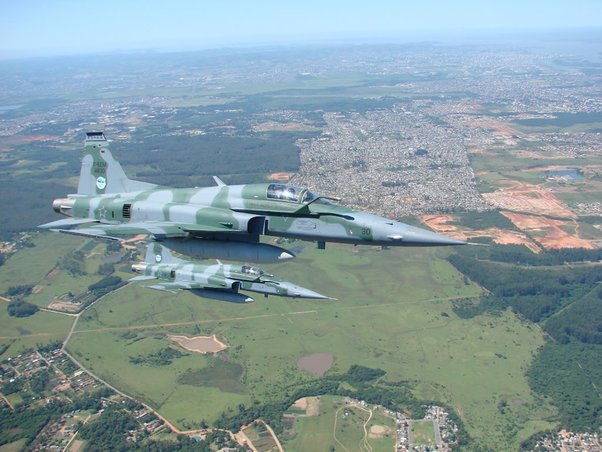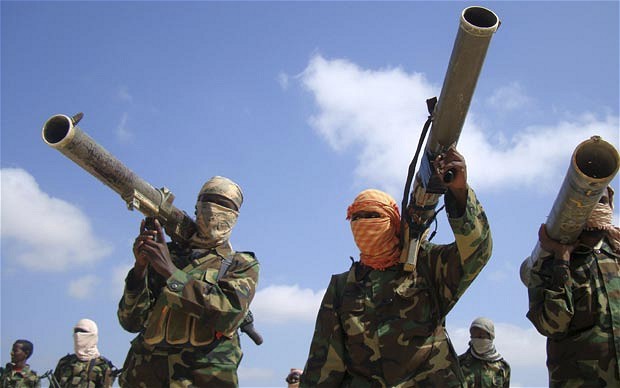The crew room at Laikipia Air Base was a flurry of activity and a cacophony of telephones ringing off the hook. Fighter pilot Major Ahmednasir Ramah sweated copiously inside his flight suit as he waited anxiously beside the telephone, glancing every few seconds at the crew-room clock.
Deep in his bones, he felt
that either this mission would pass as a blip in his military career or it
would be his last. Ramah held the telephone handset tight, raised it to his
ear, and listened.
“Interdiction mission,” the
voice on the other end said. The Air Force Commander never issued mission
orders to pilots, only through the Chief of Operations and Ops Room. But this
was not a regular mission.
“Yes, sir,” he said. Of all
the times he had been on ‘Red’ standby, nothing had ever happened for him to
respond. He held the receiver with both hands, but still, it shook.
At the cockpit of the F5, he
felt trapped, restless, and angry, and it seemed hours between each pre-flight
check. When he lowered the canopy over him, he saw a speck of carbon directly
in his line of vision. Instead of calling the chief engineer of the crew
responsible for cleaning it, he cleaned it himself.
Under full heat up and with
the driving thrust of the afterburners hurling him aloft, Ramah informed base,
“Simba Moto airborne and climbing.”
 |
| Source: warsheekh.com |
He established communication
with the surveillance mission monitoring the enemy movement inside Somalia.
“No activity at Echo
November base; no weapon nest detected.”
He communicated with his
escort. “Malaika Two, we are going to initiate attack plan Sungura. Attack plan
Sungura called for a low-level stalk. The ground clutter would obscure the
enemy radar and conceal their approach until they were in the position to pull
up into an attack vector above and behind the target.
They flew low-high-low, lifting
and falling over the undulating knolls and vegetated areas, so low that the
herds of Somali cattle, goats, and sheep scattered beneath them as they zoomed
in on Jilib, al-Shabaab’s strategic base that the AMISOM forces had not been
able to capture.
“Approaching the target,” he
announced. “Pull up in ten, nine, eight …”
“Leader, this is Malaika
One. I have suspicious movement—”
“Malaika One, say again …
pulling up now.”
And he pulled the throttle. Above,
the sky was a dark, unnatural blue, yet he hadn’t located the target. It was
down there, camouflaged.
 |
| Source: www.wired.com |
“Leader, incoming;
surface-to-air, eleven o’clock!”
Ramah eased back on the
controls and went up in a brutal climb, the anti-missile alarms screaming,
evading the missile.
“Simba Moto, this is Malaika
One,” the surveillance command leader shouted in his headphones, rapidly and
urgent. “Abort mission! I repeat, abort. Target hostile. Detected three SAM
nests all aimed at you.”
“Malaika Two, break off and
regroup for an attack,” Ramah ordered his escort. He switched to the closed-command
net and spoke to his escort pilot.
“Malaika Two, this is Leader.
We approach again for the attack.”
“Negative! I say again,
negative! Target too hostile!”
 |
| Source: quora.com |
“Remember what they did to
us, our brothers. They massacred them. This is a revenge mission,” he shouted
into his mask. “Conform to me!”
There was a brief silence
before his escort said, “Malaika Two conforming.”
“Let’s kill them, buddy,”
Ramah yelled.
Al-Shabaab had attacked the
Kenya Defence Forces base in Afmadhow at dawn, just like they did in Elade in
2016. This time they were ruthless—no one survived. When the contact report was
sent to the Ops Room, they could not respond until the Joint Operations
Commander cleared them, who preferred to send in army aviation first. All the
helicopters were downed. Not ready to commit more air assets, the air force remained
on ‘Red’ standby only. While the authorities debated strategy and played
politics, the enemy was escaping. And when they had finally been authorised, it
was not to support their fellow soldiers on the ground six hours later. There was
no need. Instead, they were to target the enemy’s strategic base, Jilib.
Ramah had heard it in the air
force commander’s voice: bomb everything. He intended to decimate the enemy,
even if it meant flattening the whole of Jilib.
“Move to Pull-up-Point Mwewe
and approach,” Ramah ordered.
On their second approach to
the target, the enemy fired at him from three locations. However, he spotted
the missiles a little too late. He pulled back with all his strength against
his joystick, but he felt himself fighting gravity, the F5 opposing his efforts
to control it.
Ramah tensed every muscle in
his body, trying to make the F5 resist plummet. He whirled aloft, trying for
the advantage of height. His vision narrowed, blurred, and he couldn’t see
beyond the cockpit. Oh, shit. I’m hit,
and I’m losing blood. He was struggling to hold his right hand on the
control.
His throat became dry and parched with agitation,
horror, fear, and grief. His efforts to
salvage himself was pantomime deceit, and he said to himself: I should have aborted the mission.
Down below, he saw the whole of Jilib coming
onto him head-on. He saw another missile rising in his peripheral vision, and
he knew that he was a goner. His anger and thirst to avenge his slain brothers had
worn his nerves and strained his judgement. Still, he was not going to go down
that easily.
He reached for the throttle using his
left hand and hurled the F5 into a hard turn, but it got the cockpit canopy.
The fighter jet tumbled, and it lost life and flying capability. He groped for
the ejector seat handle and hauled it down, blind, but when he pulled it,
nothing happened—it did not hurl him free of the doomed F5.
The F5 plummeted with suicidal force,
losing height rapidly, the earth swaying through his line of vision. The
realisation he was crashing in the enemy territory crashed his heart, for, at
that moment, the new reality sank in, the pain of failure and separation from
loved ones.
Even as he resigned himself to his fate,
he let down the landing gears. Below, he saw where the fighter was headed—a
rocky ground, sparse green vegetation, haphazardly laid-out buildings.
He could see men, women, and children
stop and look up at him. So close that he could see their shocked and
apprehensive looks. He saw armed men emerge from the sparse vegetation and
point their rifles and guns upwards.
All fuel corks closed, all switches off,
and he braced himself for the final crashing.
When it hit the ground, the F5 sheered
through, disintegrating piece by piece. Rocks cut through metal, wings broke
away, and the fuselage cartwheeled in
the open ground with Ramah trapped inside.
Ramah could not feel his body, but his
sense of smell was still strong. He smelled the pervasive reek of JET-A1 fuel,
and he knew it was a matter of time before it exploded. He had a decision to
make—stay in and be obliterated to nothing, or get out and be captured by
al-Ashabaab. However, when death is imminent, only survival instinct rules.
He released the straps that held him to
his seat, lifted the steel canopy breaker, and began pounding the perspex dome
above his head. He could hear the pinging and tinkling sound made by white-hot
metal as fuel fell on it. Summoning his last efforts, he tore an opening in the
perspex just as a ruptured fuel-pressure line somewhere in the shattered
fuselage sprayed a jet of JET-A1 high in the air. It fell in a heavy drizzle upon
the canopy, into his face. It drenched his shoulders and the front of his
flight suit. In the distance, he heard voices: one distinct voice was calling
him home, and the others were shouting Allahu Akbar.
 |
| Source: kahawatungu.com |
For the first time in his military
career, he knew that dying for his country was not vai. He had lived by the
Kenya Air Force motto: Tuko Imara Angani. And to his last breath, he had
remained steadfast in the skies, protecting Kenya’s airspace from external
aggression by taking the war to the enemy.
***
He was still alive when al-Shabaab
dragged him out through the opening in the canopy. Not even his mangled body
could hold off the terror that the dastard terrorists intended to rain on him.
Allahu
Akbar! Allahu Akbar! They chanted.
Allah
They let his body fall face down on the
dusty ground, and thousands of feet stepped on him. When he lifted his head, he
saw women and children running from all directions to where he was, each
carrying a weapon, anything they could lay their hands on. The voices were
shrill but faint, and the words were in Somali, Arabic, Somali dialects, and
Swahili.
He didn’t know they were singing from
Quran 2:91—Kill them wherever you come upon them and drive them out of the
places from which they have driven you out. Na
wauweni popote mwakutapo, na muwatoe popote walipo kutoeni …
Even
Kenyans have come this far in Somalia?
Hands grabbed him, each wanting a pound of his flesh.
Allahu
Akbar! Allahu Akbar!
Blood and lymph bubbled from his
nostrils, his body writhed and spasmed, and unbearable agony hit him as they
dragged him.
Oh,
no! Killed and my body dragged in the streets of Jilib!
He moaned, and he breathed his last.
Comments
Post a Comment
Did you like the story? Leave me your thoughts, please. Thank you!!!